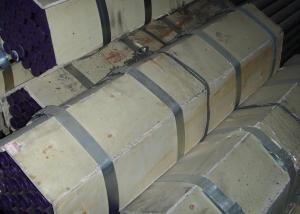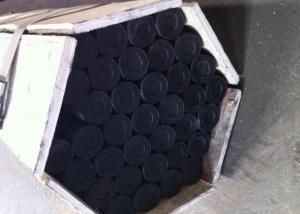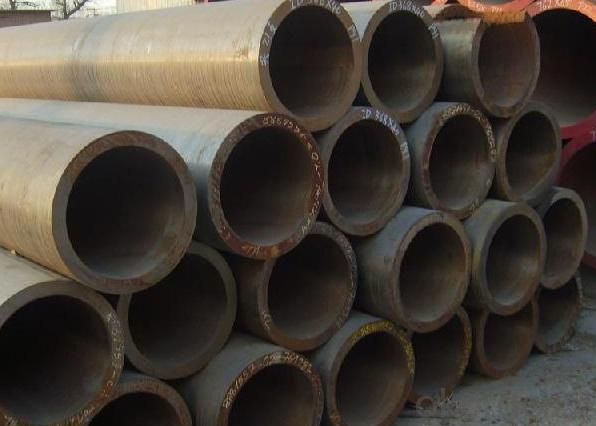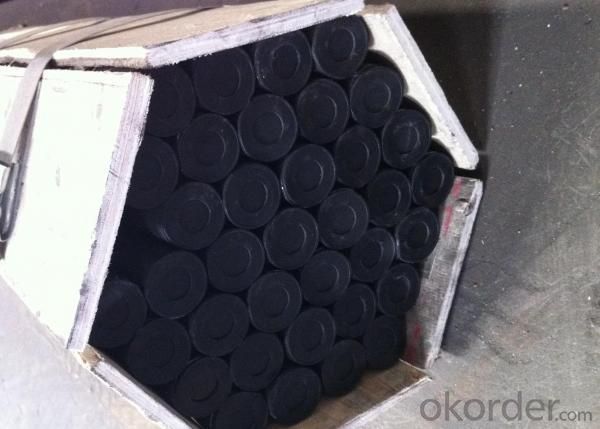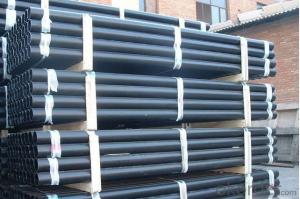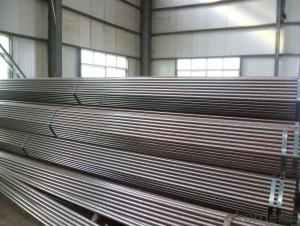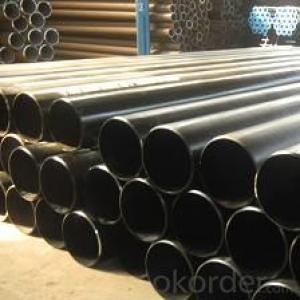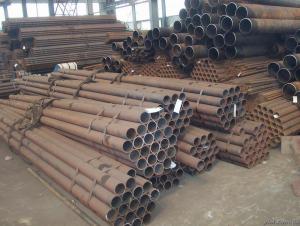Seamless Carbon Steel Tubes
- Loading Port:
- China Main Port
- Payment Terms:
- TT or LC
- Min Order Qty:
- 20MT m.t.
- Supply Capability:
- 5000 Tons Per Month m.t./month
OKorder Service Pledge
OKorder Financial Service
You Might Also Like
Usage/Applications: For manufacture wall panel,economizer,reheater,superheater and steam pipeline of boilers. | |||||||||||||||||||||||||
Packaging & Delivery:
Each bundles pipes will be bundled with 6-8 pcs steel strips and with shipping marks and 2 nylon strips
40-50 days delivery on china port upon receiving orinigal LC or prepayment.
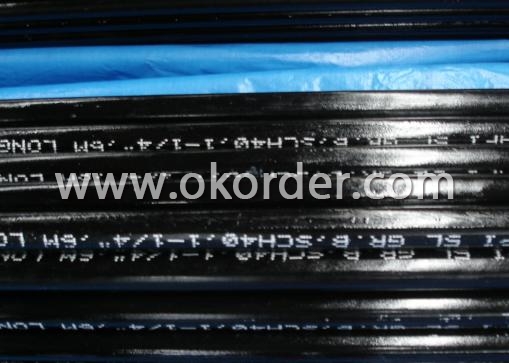
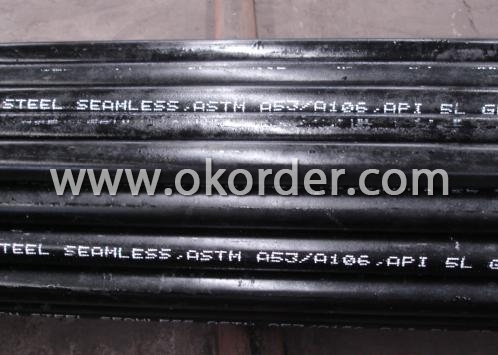
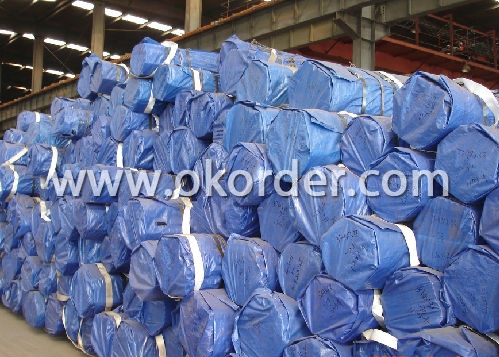
- Q: Can steel pipes be used for underground irrigation systems?
- Certainly, underground irrigation systems can indeed utilize steel pipes. Steel pipes have gained popularity for irrigation systems owing to their exceptional durability, strength, and corrosion resistance. They have the capability to endure the immense pressure and stress associated with being buried underground, thus ensuring longevity without the need for frequent maintenance or replacement. Moreover, the smooth interior surface of steel pipes enables efficient water flow and minimizes the risk of clogging. Additionally, steel pipes are readily available in a variety of sizes and can be easily customized to meet specific requirements of irrigation systems. However, it is crucial to ensure that the steel pipes employed for underground irrigation systems are adequately coated or treated to prevent corrosion and extend their lifespan.
- Q: How are steel pipes protected against lightning strikes?
- Steel pipes are protected against lightning strikes by installing lightning rods or grounding systems on top of the structures where the pipes are located. These systems help to divert the electrical discharge from lightning strikes, reducing the risk of damage to the steel pipes.
- Q: How to establish a concrete-filled steel tubular column model in ANSYS?
- A two unit model or a composite unit model can be adoptedTwo units are constructed of steel tubes and concreteA composite unit may be either a fiber element or a section conversion attribute
- Q: Difference between seamless steel pipe and welded pipe
- Welding pipes can be used in water pipelines, gas pipelines, heating pipes, electrical appliances, pipelines and so on.
- Q: What are the factors to consider when selecting steel pipes for a specific application?
- When selecting steel pipes for a specific application, there are several factors to consider. The first is the type of steel needed, which can vary based on factors such as the desired strength, corrosion resistance, and temperature resistance. Secondly, the size and dimensions of the pipes should be evaluated to ensure they meet the requirements of the application. Additionally, the specific application's operating conditions, such as pressure, temperature, and environment, should be taken into account. The manufacturing process and quality standards of the steel pipes, as well as the supplier's reputation and reliability, should also be considered. Lastly, cost-effectiveness and budget constraints are essential factors to keep in mind when selecting steel pipes for a specific application.
- Q: Can steel pipes be used for stormwater management systems?
- Yes, steel pipes can be used for stormwater management systems. Steel pipes are commonly used in stormwater management systems for their durability, strength, and resistance to corrosion. They can efficiently transport stormwater runoff, helping to manage and control its flow. Additionally, steel pipes can be customized to meet specific project requirements, making them a versatile choice for stormwater management systems.
- Q: What are the different methods of cutting steel pipes?
- There are several methods of cutting steel pipes, including manual methods such as hacksawing and pipe cutters, as well as more advanced methods like plasma cutting, oxy-fuel cutting, and bandsaw cutting. Each method has its own advantages and suitability depending on the specific requirements of the project.
- Q: What are the different types of valves used with steel pipes?
- There are several types of valves used with steel pipes, including ball valves, gate valves, globe valves, check valves, and butterfly valves.
- Q: Are steel pipes resistant to chemicals and corrosion?
- Generally speaking, steel pipes possess a high resistance to chemicals and corrosion. To further enhance this resistance, protective layers such as zinc or epoxy are often applied to steel pipes. These coatings serve as a barrier, preventing direct contact between chemicals and the steel, thus reducing the risk of corrosion. Moreover, steel itself possesses inherent corrosion-resistant properties, making it a suitable material for applications where exposure to chemicals and corrosive elements is common. However, it is worth noting that the level of resistance may vary depending on the specific type of steel, the chosen coating, and the particular chemicals or corrosive substances involved. Therefore, it is advisable to seek advice from experts and carefully consider the specific requirements of the intended application to ensure the appropriate selection of steel and protective measures, thereby maximizing resistance to chemicals and corrosion.
- Q: Are steel pipes environmentally friendly?
- Steel pipes can be considered environmentally friendly due to their high durability and recyclability. Steel is a sustainable material that can be reused multiple times without losing its structural integrity. Additionally, steel pipes have low emission rates during production and can be coated to prevent corrosion, extending their lifespan. However, the environmental impact of steel pipes also depends on factors such as extraction of raw materials and energy consumption during manufacturing.
1. Manufacturer Overview
| Location | Wuxi, China |
| Year Established | 1991 |
| Annual Output Value | 300,000Tons |
| Main Markets | Europe; Southeast Asia; etc. |
| Company Certifications | API 5L;API 5CT;API Q1;ISO/TS29001 |
2. Manufacturer Certificates
| a) Certification Name | |
| Range | |
| Reference | |
| Validity Period |
3. Manufacturer Capability
| a) Trade Capacity | |
| Nearest Port | Wuxi; Shanghai |
| Export Percentage | 41% - 50% |
| No.of Employees in Trade Department | 3900-4000 People |
| Language Spoken: | English; Chinese; Spanish |
| b) Factory Information | |
| Factory Size: | Above 450,000 square meters |
| No. of Production Lines | Above 10 |
| Contract Manufacturing | OEM Service Offered;Design Service Offered |
| Product Price Range | Average |
Send your message to us
Seamless Carbon Steel Tubes
- Loading Port:
- China Main Port
- Payment Terms:
- TT or LC
- Min Order Qty:
- 20MT m.t.
- Supply Capability:
- 5000 Tons Per Month m.t./month
OKorder Service Pledge
OKorder Financial Service
Similar products
Hot products
Hot Searches
Related keywords

